Land Hey(Sisters duo|“The Power of Sign Language” delivered by sisters)
2025.10.09
Deaf actor
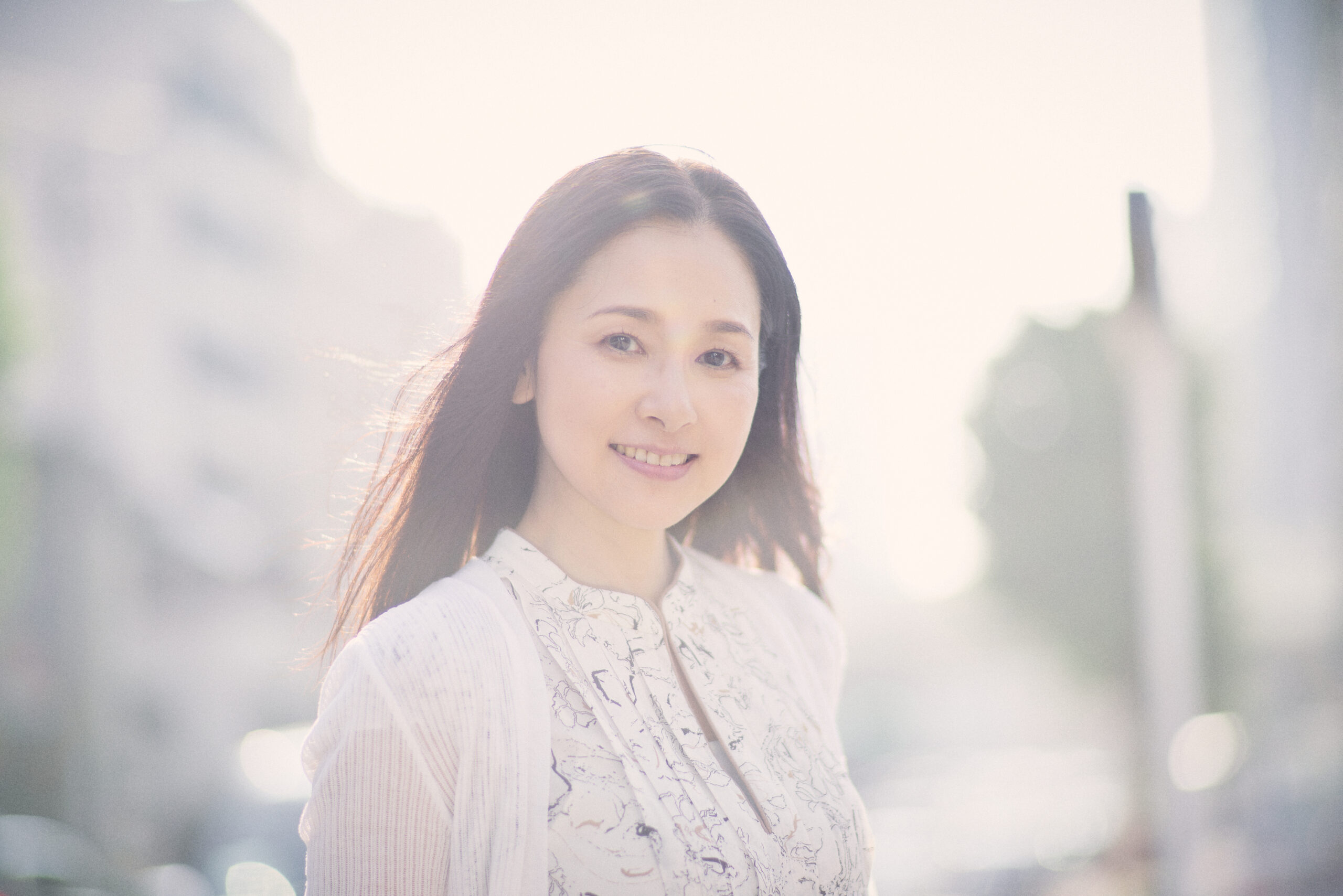
2025.08.06
She made her screen debut as Japan’s first Deaf actress to star in the film “I Love You” released in 1999.
Since then, Akiko Oshidari has carved out a field of activity as a Deaf actor, including movies, TV, commercials, and performing on stage.
From her straight gaze as she says, “I want to reflect the realistic expression of people in my works,” I could feel an unshakable belief even in her softness.
目次
――Speaking of your appearances, the film “Living in Two Worlds ” released in 2024 is fresh in my memory. You won the Best Supporting Actress award at several film awards, making it a work that resonated with many people, but what was important to you when acting?
Oshidari This work is a story about the growth and conflict of a CODA boy born to parents who cannot hear, and the bond between parent and child. I played the role of the boy’s mother, but in real life, I have a daughter who is in the second year of junior high school. She is also a CODA. In the film, I played the role of the boy’s mother, but the scene dealing with a rebellious son overlapped with my daily life with my daughter, which was very emotionally moving.
――So your real life was also useful in playing the role.
Oshidari That’s right. What was particularly impressive was the scene where the junior high school son, played by Ryo Yoshizawa, says in a strong tone, “I didn’t want to be born into a house like this!” That line pierced my heart, and I was really shocked and gave me goosebumps… I tried not to hide such real emotions and to show it on my face. Director Kure Miho also told me to act naturally, so I didn’t dare to create feelings such as worries, conflicts, and hesitation as a mother of a rebellious child, but I tried to act as naturally as possible.
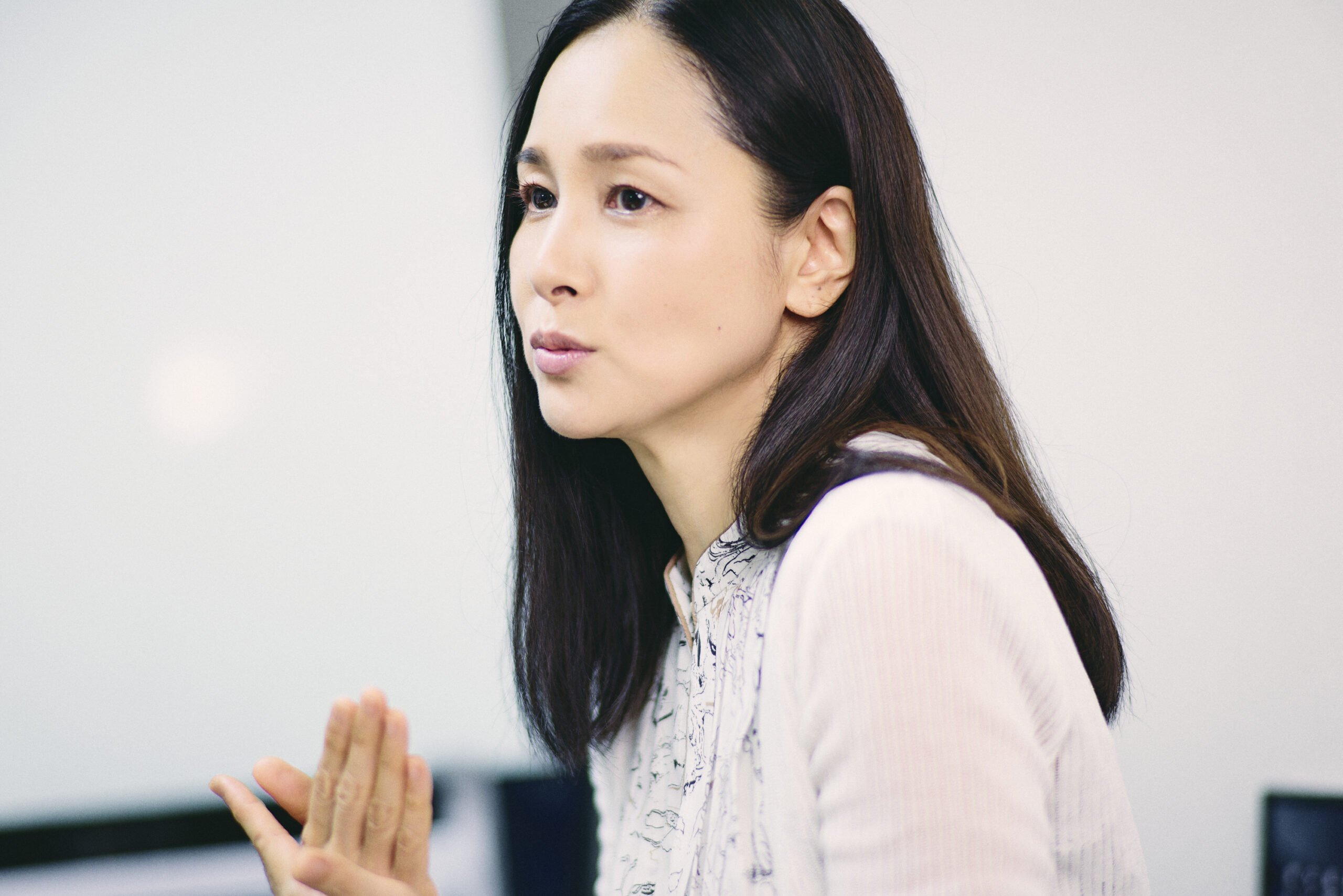
――There was something that welled up inside me watching that scene. On the other hand, your comical performance was also very charming and wonderful!
Oshidari Thank you. In fact, the director often teased me at the filming location, saying, “You are a naturally funny person” (laughs). She said, “That’s what makes you interesting.” Thanks to that atmosphere, I may have been able to create a natural gap with the serious scenes.
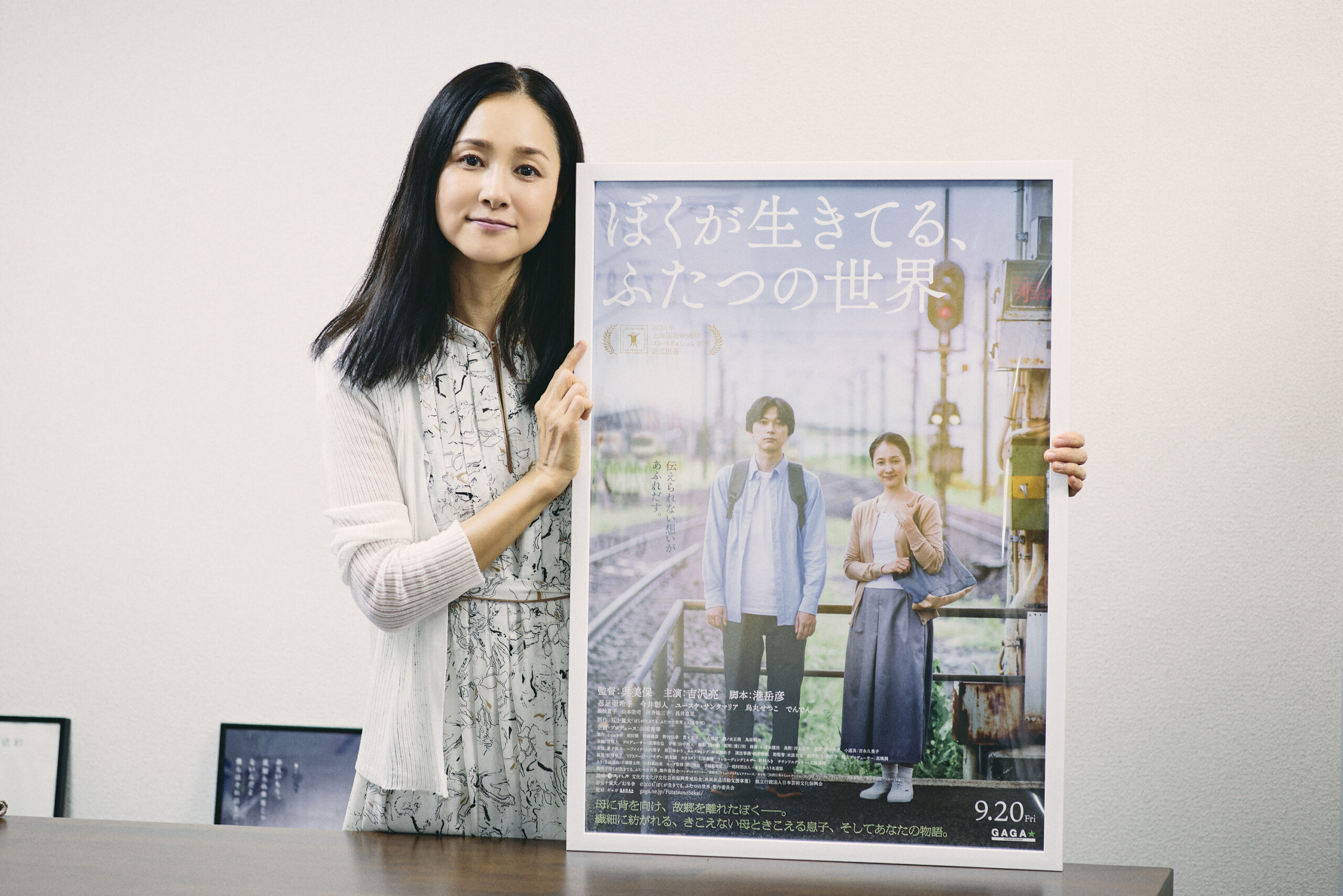
――What kind of child were you when you were a child?
Oshidari Don’t mean to brag, but I think I was a bright and interesting child. I loved The Drifters’ slapstick comedy show “It’s 8 o’clock! Let’s get together!” which was broadcasted from 8 o’clock every Saturday.
Since it was a slapstick comedy show, there were many gestures and it was easy to understand, and above all, it was interesting. I often imitated it and made my family laugh (laughs).
――You were a humorous child. When did you realize that you couldn’t hear it?
Oshidari I was 4 years old. At that time, my family lived in Hokkaido. My family lived in my parents’ hometown of Yokohama City, Kanagawa Prefecture, but we moved to Chitose City, Hokkaido due to my father’s relocation where I was born. When I was 4 years old, my parents felt strange that I didn’t turn around when they called my name, so they took me to the hospital. As a result of the examination, they found that I was Deaf. They seemed to think that my language development was a little behind that of the children around me, but there are individual differences, and my parents didn’t seem to care much about it until then.
――You went to school for the Deaf in Yokohama City, right?
Oshidari That’s right. They had a plan to raise children in Hokkaido, but Hokkaido is large, so it is far away to go to the school for the Deaf, such as taking trains and buses. So, after thinking about it, my parents decided to return to their hometown.
I moved from Hokkaido to Yokohama at the age of 4 and attended the Yokohama City School for the Deaf (now the Yokohama City Special Needs School for the Deaf) from the second year of kindergarten to the sixth year of elementary school. There are four schools for the Deaf in Kanagawa Prefecture, but they thought it would be a good environment to learn words as the school in Yokohama put a lot of emphasis on oral education. At first, I wasn’t very aware that I was Deaf, but when I was in the fourth year of elementary school, I suddenly started to think, “Why do I have to do oral training so hard?” and I remember undergoing a conflict.
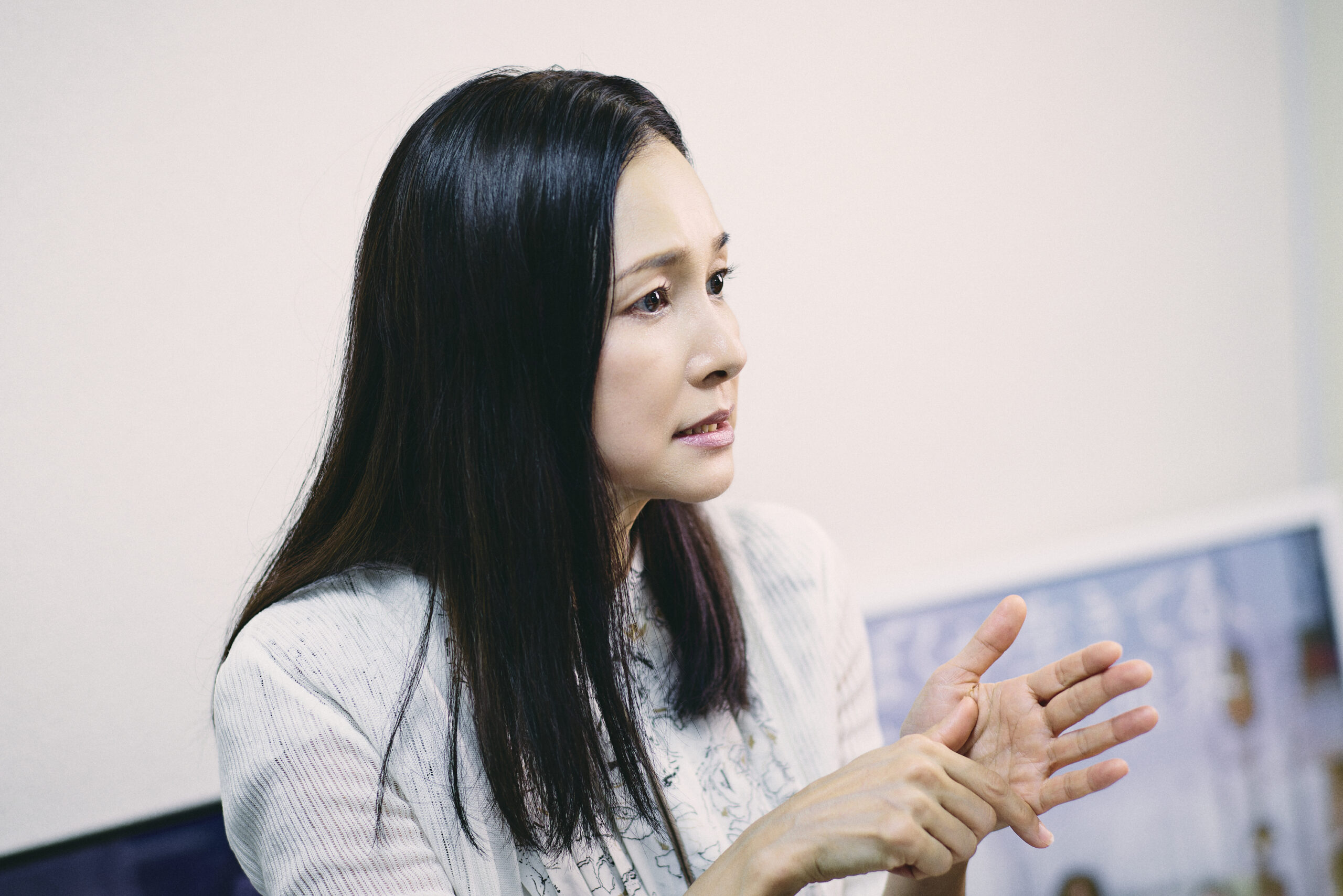
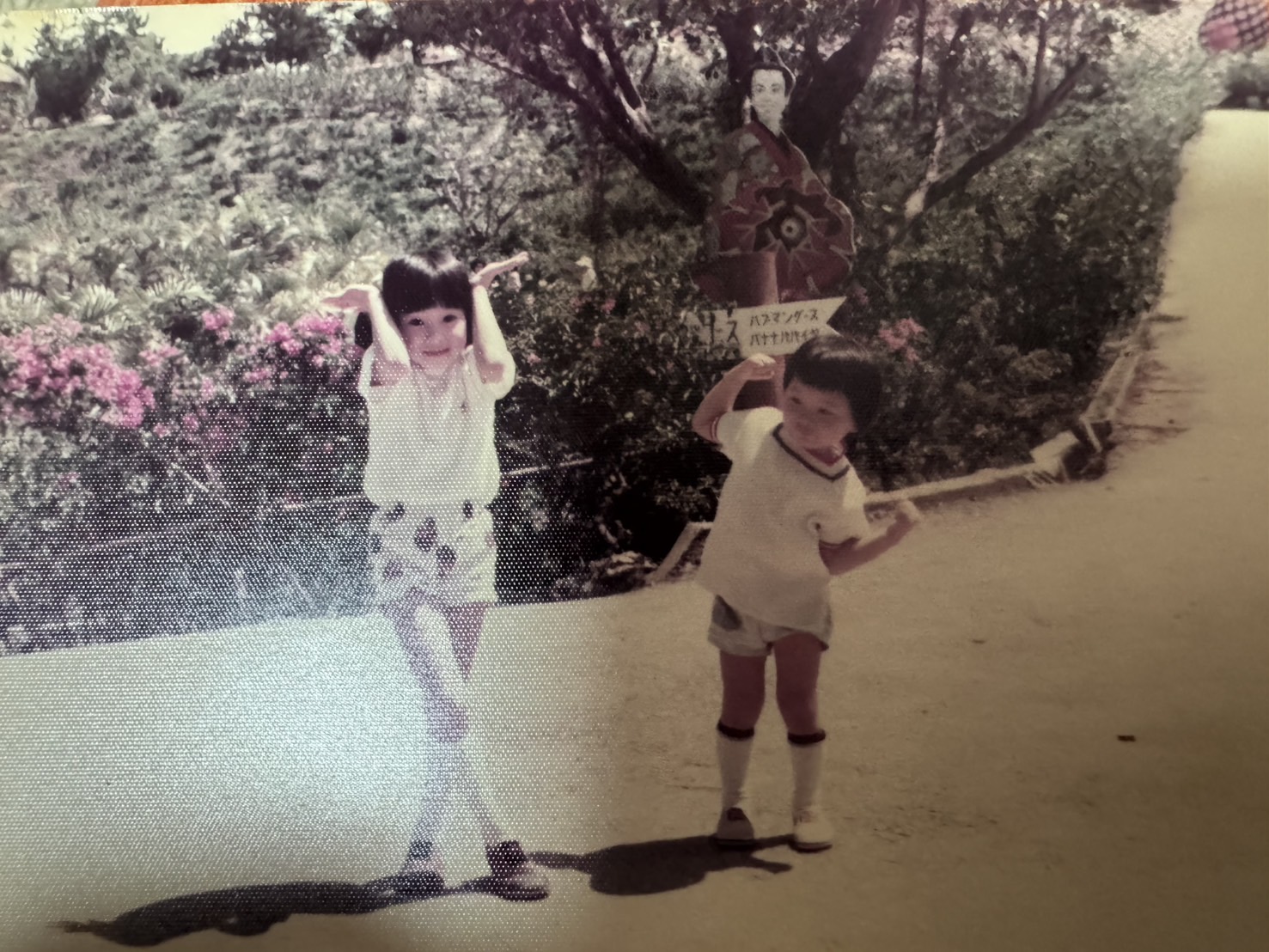
――Did you spend all your time in Yokohama from kindergarten?
Oshidari When I was in the first year of junior high school, I moved again to Nagoya due to my father’s relocation. I attended a school for the Deaf in Nagoya until the summer of my first year of high school. My parents were worried about transferring schools and cared about me, but I was rather more fun and excited to think, “Great! I can make new friends”. In the beginning, they asked me, “Where are you from?” which is a common experience of a transfer student and got in a minor scuffle… (laughs). Sign language was very popular at the school for the Deaf in Nagoya, and all my studies were taught in sign language. I gradually got used to the differences from the school in Yokohama.
I thought I would be able to spend time in Nagoya until I graduated from high school, but my father wanted to return to Yokohama someday, so I decided to return to Yokohama School for the Deaf again in the fall of my first year of high school.
――You looked at the frequent school transfers positively. After graduating from high school, you went on to Aoba Gakuen Junior College in Tokyo (closed in 2007), what was your student life like?
Oshidari At first, I had no intention of going to university, but I was thinking of getting a job. But before that, I wanted to experience student life at least once, so I decided to go to junior college. However, the curriculum of the school for the Deaf is about two years behind the usual curriculum. Therefore, I thought that it might give me too much of a head start. There were some universities where I actually didn’t pass, but I received a notice of acceptance from Aoba Gakuen Junior College. Looking back, I think it was a really good experience to be blessed with many friends at the junior college and to interact with the hearing students.
――It was a fulfilling two years.
Oshidari That’s right. The first thing I worked hard to find after entering the school was “friends”. When the teacher faces the blackboard and talks during class, I can’t see the movement of the mouth and I can’t understand the contents. So, I decided to make friends to keep up with the classes.
When I thought, “This person looks easy to talk to,” I ran up to that person after class and tried to actively talk, “I’m Deaf, so can you help me to just show me your notebook once in a while?” In the meantime, I made more friends, and I joined a club activity. It was a really fun two years when we all went bowling and went out to eat.
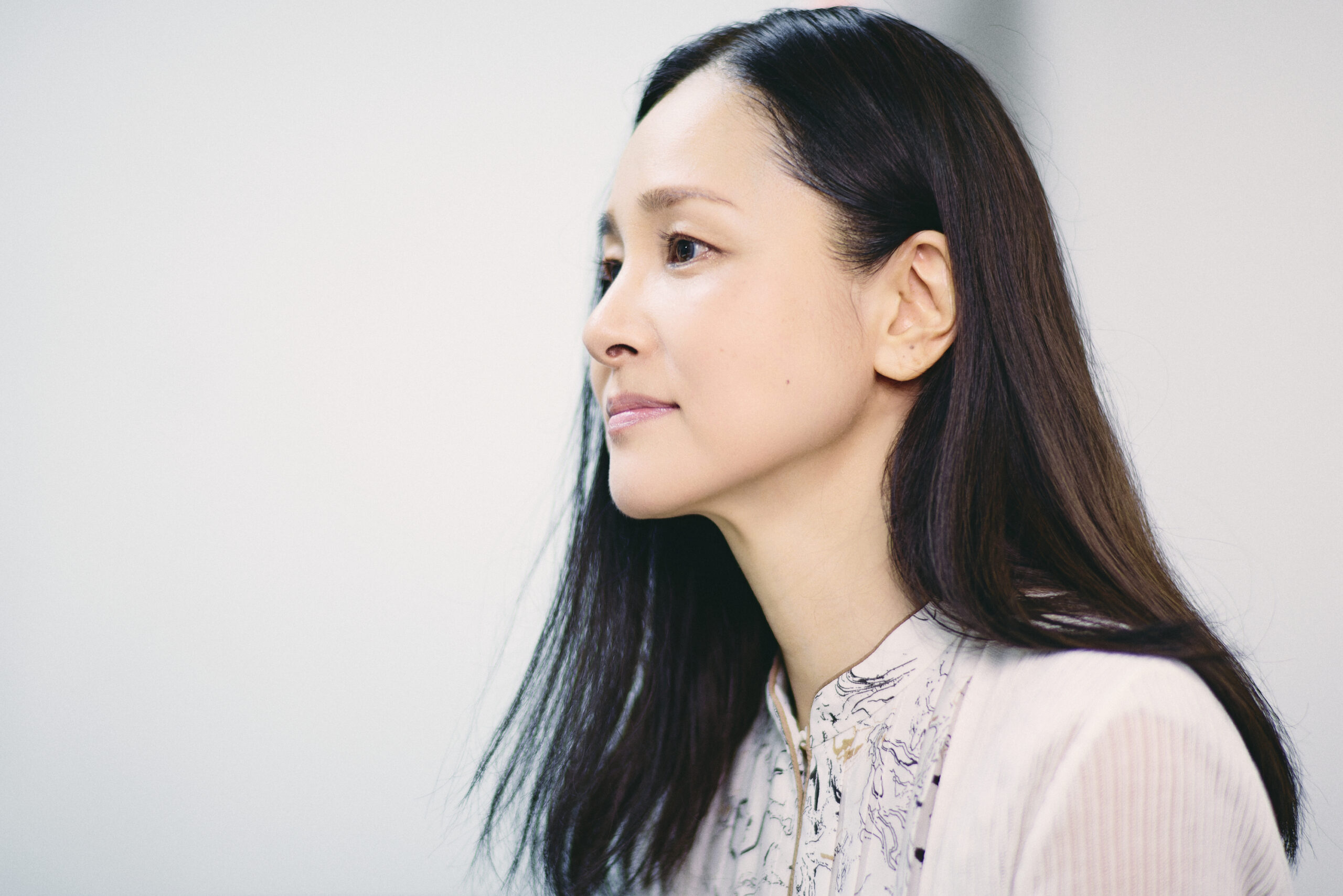
――Did you have any dreams or goals for the future that you had envisioned at that time?
Oshidari Hmm… I didn’t have any but there is a reason for this. I grew up watching my father work for ANA from a young age, so there was a time when I longed to be an airline cabin attendant. When I told my elementary school teacher about this, the teacher asked me, “Can you communicate with the customers?” and I couldn’t say anything back.
Also, I liked manga, so I also really liked drawing. So, I thought about becoming an illustrator or manga artist in the future, but this time the teacher told me, “You can’t become a manga artist without a lot of knowledge.” Every time I was advised like that, I put the brakes on my dream little by little. When I realized it, I felt like I had come to junior college without having any dreams or goals.
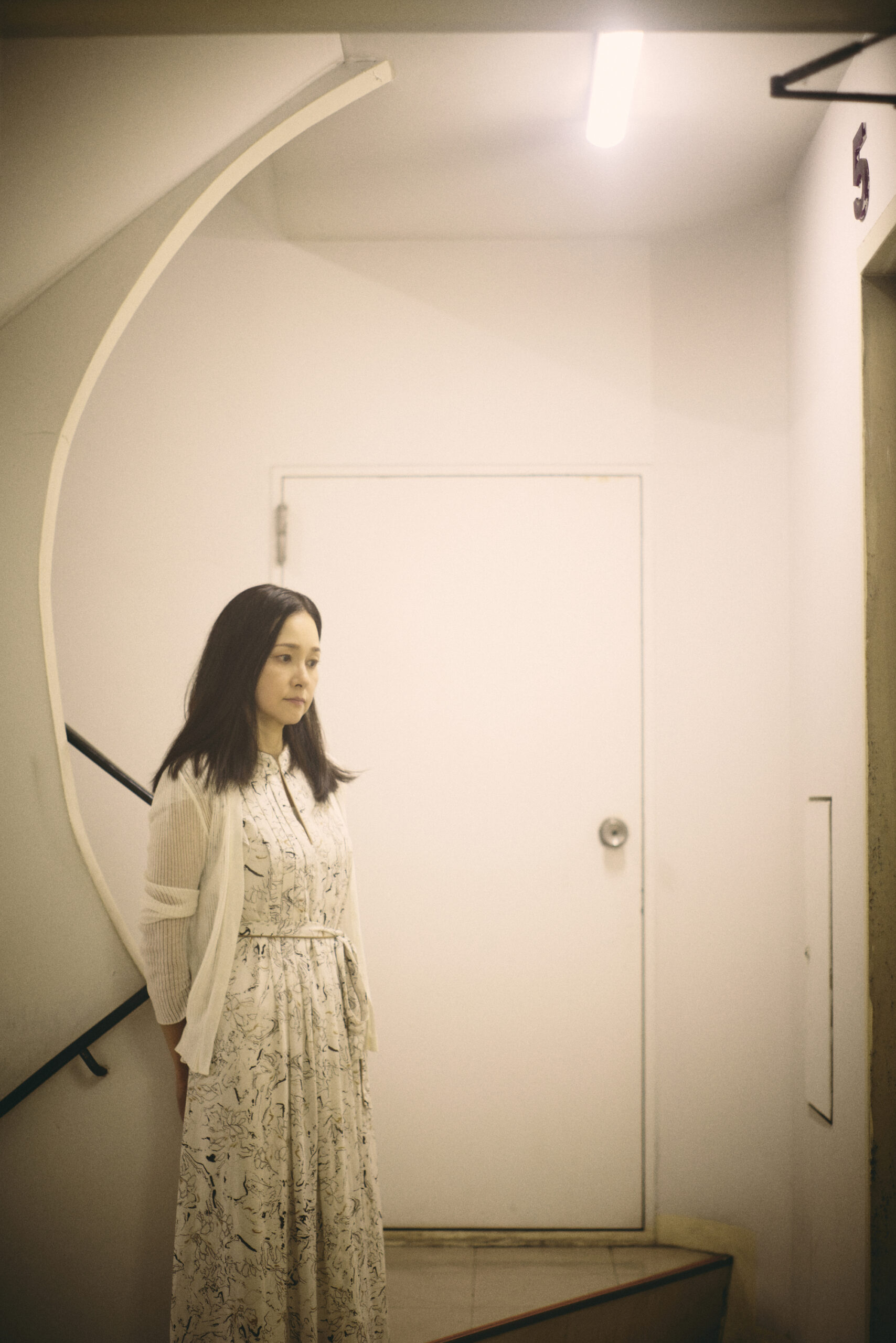
――I see… What kind of manga were you reading at that time?
Oshidari I read a wide range of manga. The first thing I got hooked on was the girl’s manga “Candy ♡ Candy”! I also liked “Doraemon”. In my case, it was manga that I first understood the difference between “written language” and “spoken language” that I learned at school. I also learned about “sound” from manga. For example, the sound of pouring rain “ザーザー” pronounced as “ZAZA” or the “vroom” of a car. There are many different sounds in the world. Silence without sound is also described as “シーン” pronounced “SHIIIIN” in manga. That kind of expression is very interesting. I also read novels, but it’s hard to get an image out of words alone, so sometimes my thoughts are cut off. However, manga has pictures and speech bubbles, so I can understand the scene quite clearly. For me, manga was like a textbook and a teacher who gave me a lot of information and knowledge.
――How did you decide to become an actor after your student days when you had no dreams for the future?
Oshidari At the recommendation of a junior college teacher, after graduation, I got a job at the Bank of Yokohama and got a general office job. But I get bored easily (laughs). I couldn’t find any satisfaction in my daily routines such as data entry, making copies, sending letters, and serving tea… So I set a deadline for myself, saying, “I’ll do my best for five years to save money.” And with only three months left until my retirement, I had the opportunity to appear on NHK “Let’s Sing in Noppo’s sign language”. I was invited by a sign language interpreter friend, but at first, I couldn’t believe it. But since I was little, I had been watching Noppo’s program, so I was happy to be able to work with him, so I decided to appear. That experience led to a sense of confidence that I might be able to do it as a Deaf person. From there, my interest sparked into the world of movies.
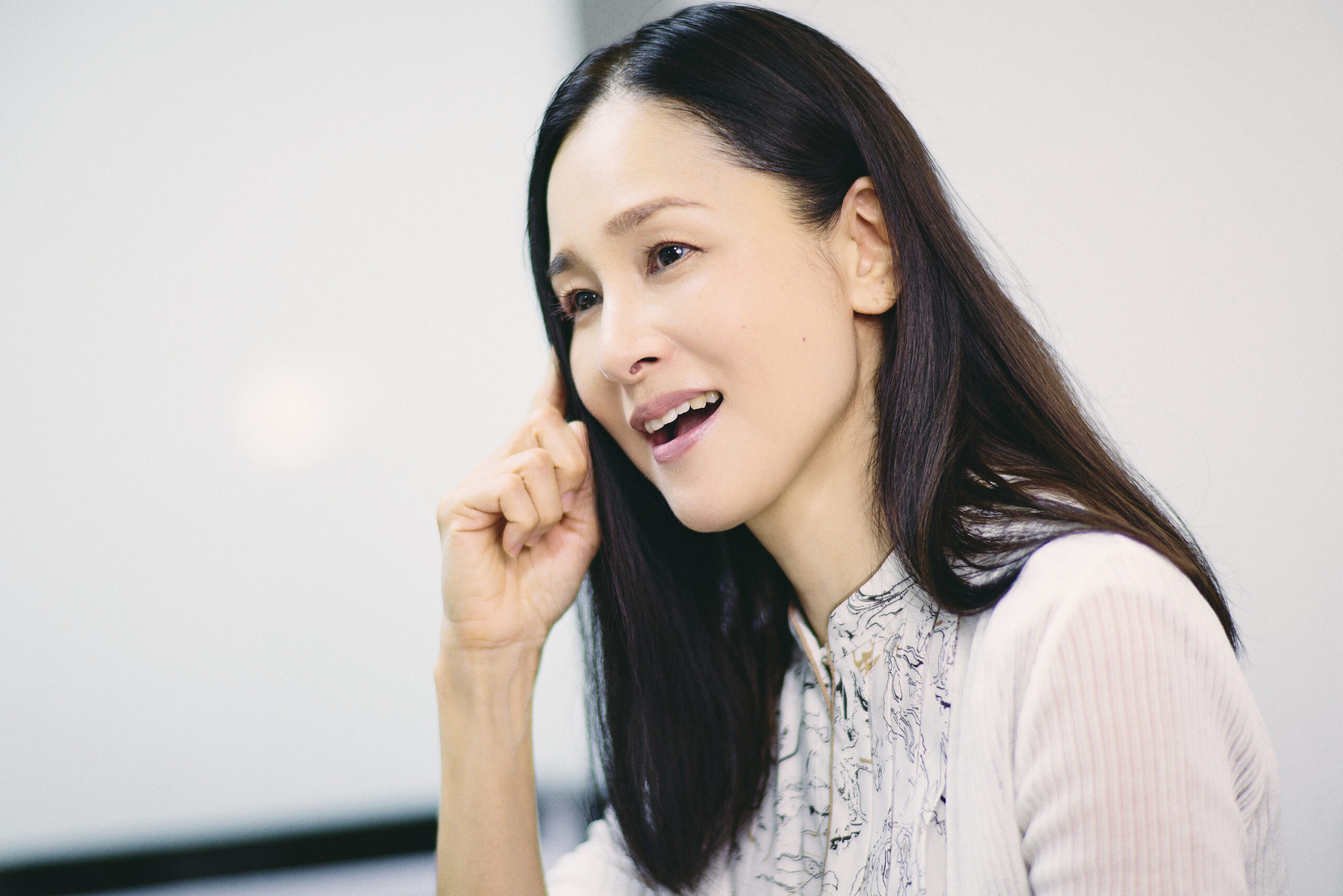
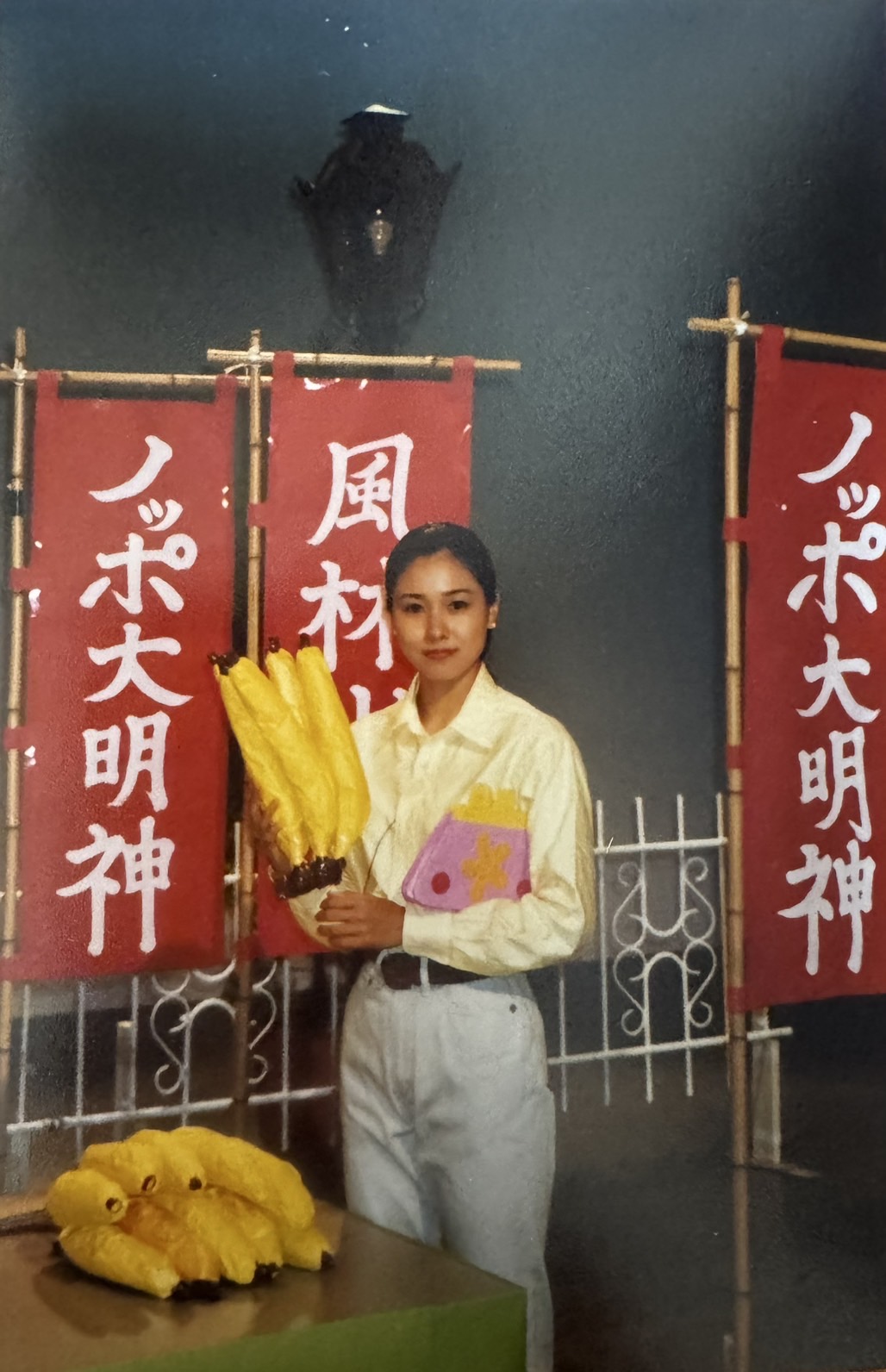
――So you were invited at a good time before you retired from the bank.
Oshidari After quitting the bank, I made some time to travel around Japan and abroad, and then auditioned for some plays and movies. One of them was a stage called “Children of a Lesser God” which was also an American movie. To be honest, I hadn’t seriously thought about becoming an actor yet, but there was something about me that attracted me to the fact that a Deaf person was playing the lead role. But the result was that I failed the final audition.
The following year, I auditioned for the movie “I Love You”. This was also a film with a Deaf woman playing the lead role, and they were looking for Deaf actors. In addition, there were two directors, one of whom was Akihiro Yonaiyama who was Deaf himself, and many of the actors were also Deaf, making it an unprecedented film ever.
I wasn’t sure whether I was up to that role, but I decided to take it because of my friend’s strong recommendation. In addition to that, there was something I really wanted to convey.
――What do you mean?
Oshidari I want to change the image of Deaf people in the world. Until then, movies and dramas often portrayed Deaf people as dark and lonely. For example, “Tell Me That You Love Me” and “The Silver Coin of Stars” and other Japanese dramas depicting Deaf people became a hot topic. It’s nice to see more people interested in sign language as a result of dramas, but on the other hand, there is also a sense of confusion that “won’t that create a fixed image?”
The actual Deaf person is a brighter being. I have a lot of friends, and I have fun talking in sign language. Such a realistic figure is not depicted in the movies very often. That’s why I came to feel strongly that I wanted to convey that reality in my own words and in my own image.
――As a result, you made your debut in the movie “I Love You”, but how did you feel about your first leading film role?
Oshidari Anyway, my honest impression is that “playing the leading role is hard…!” (laughs). Of course, I had a lot of lines, but it was really difficult to perform in front of many co-stars and staff, and above all, I was very nervous. Also, movies and dramas are not filmed in the order of the story, but suddenly the last scene is filmed, and tomorrow is the middle scene, or there is a scene where someone suddenly burst into tears. That’s why I had a hard time with how to convey my emotions (bitter smile). Moreover, I had no acting experience, so I was full of anxiety… But I just observed the actors around me at the filming location, stole the good points, and gradually found my own expression.
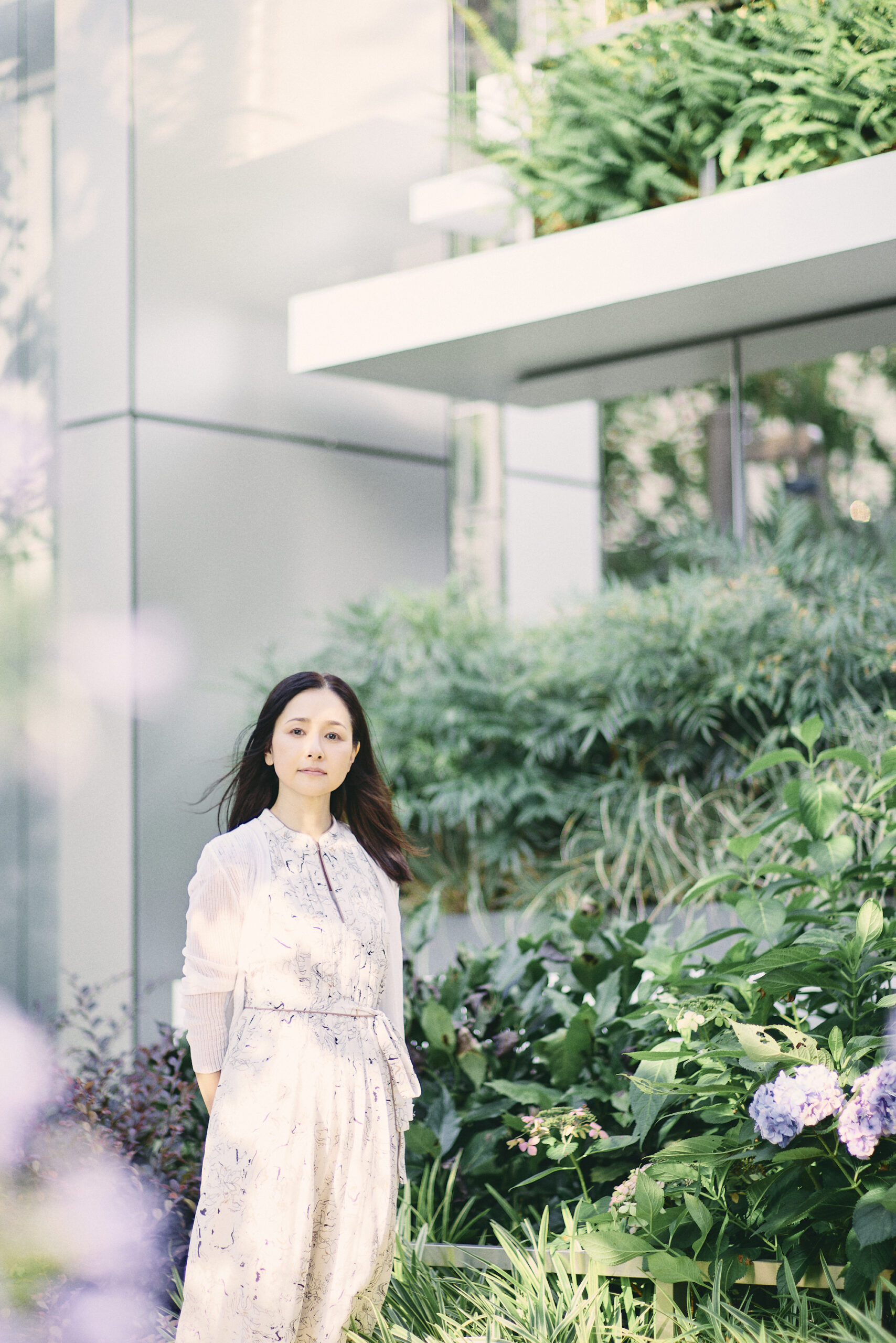
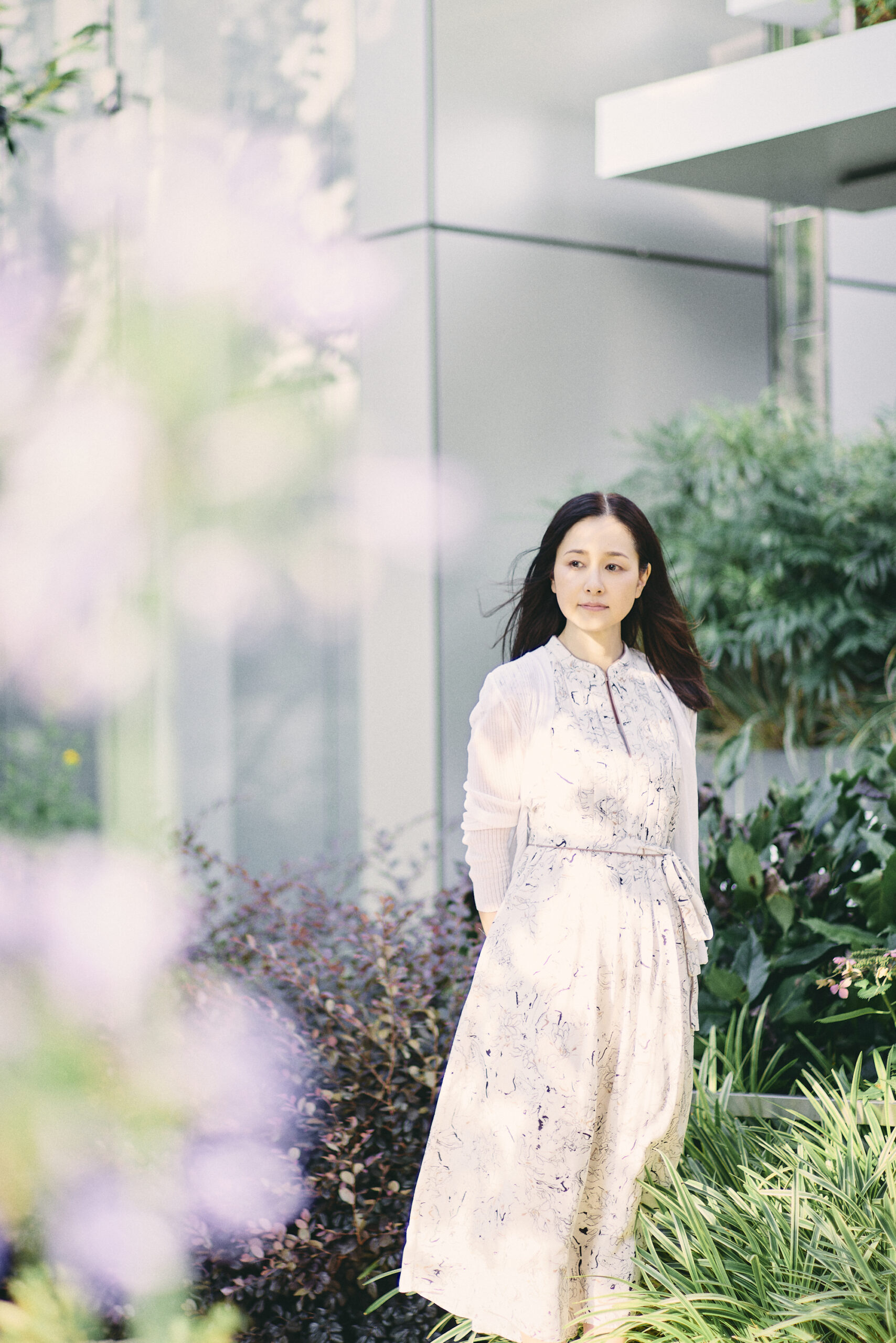
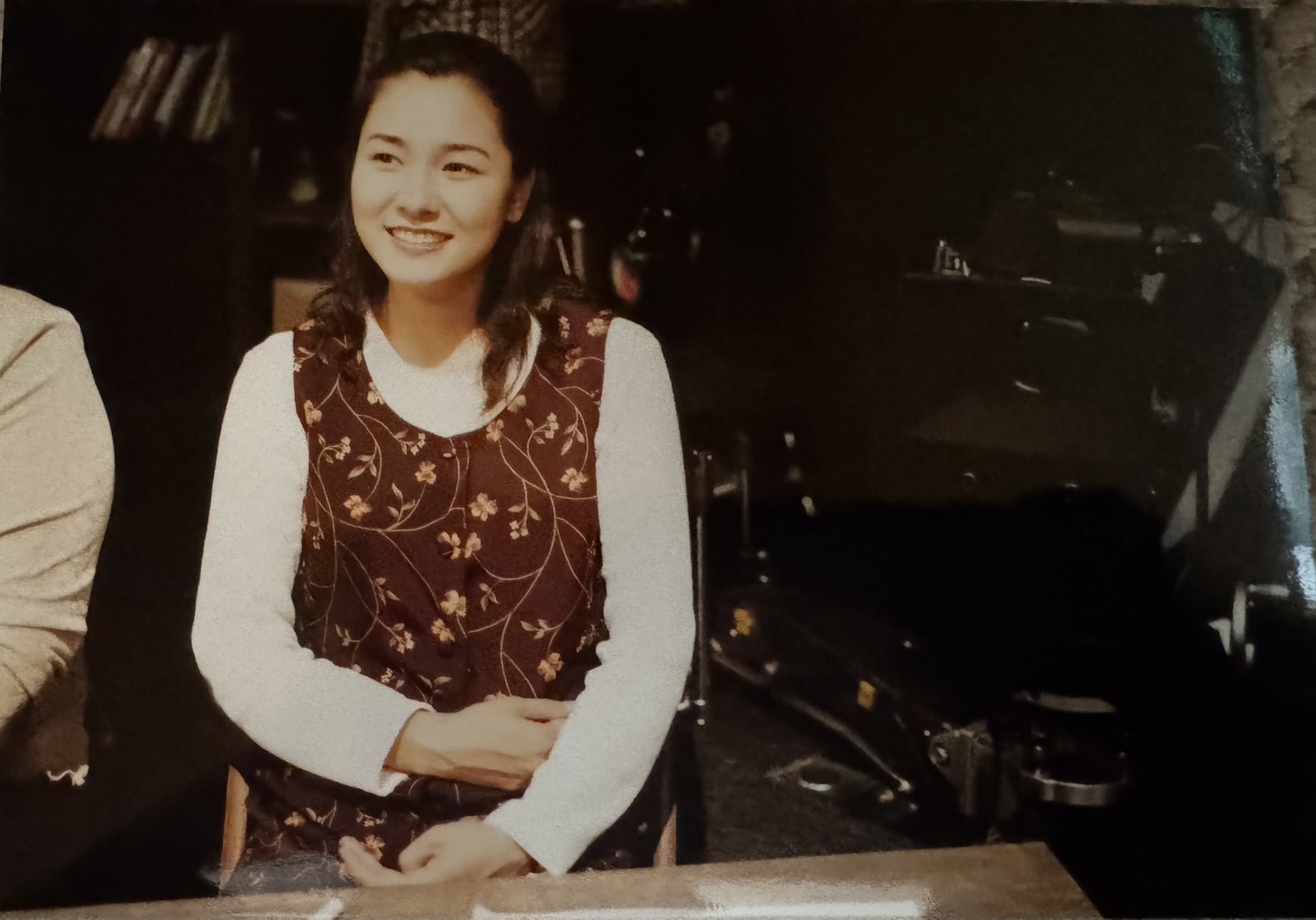
――You learned it hands-on at the filming location.
Oshidari That’s right. In particular, when it comes to facial expressions, I carefully observe the eye movements and gestures of experienced actors to know how to express a cold and gentle impression. Every day I learned something new at the filming location.
I’ve always liked watching movies since I was little, so I’ve watched a lot of foreign films. Overseas actors are particularly emotional, so I often used their facial expressions as a reference.
And for sign language expressions, I read the script many times to figure out what kind of expression I should use if it was the atmosphere of this character and expanded my image in my own way. I discussed it with the director and co-stars and created it together.
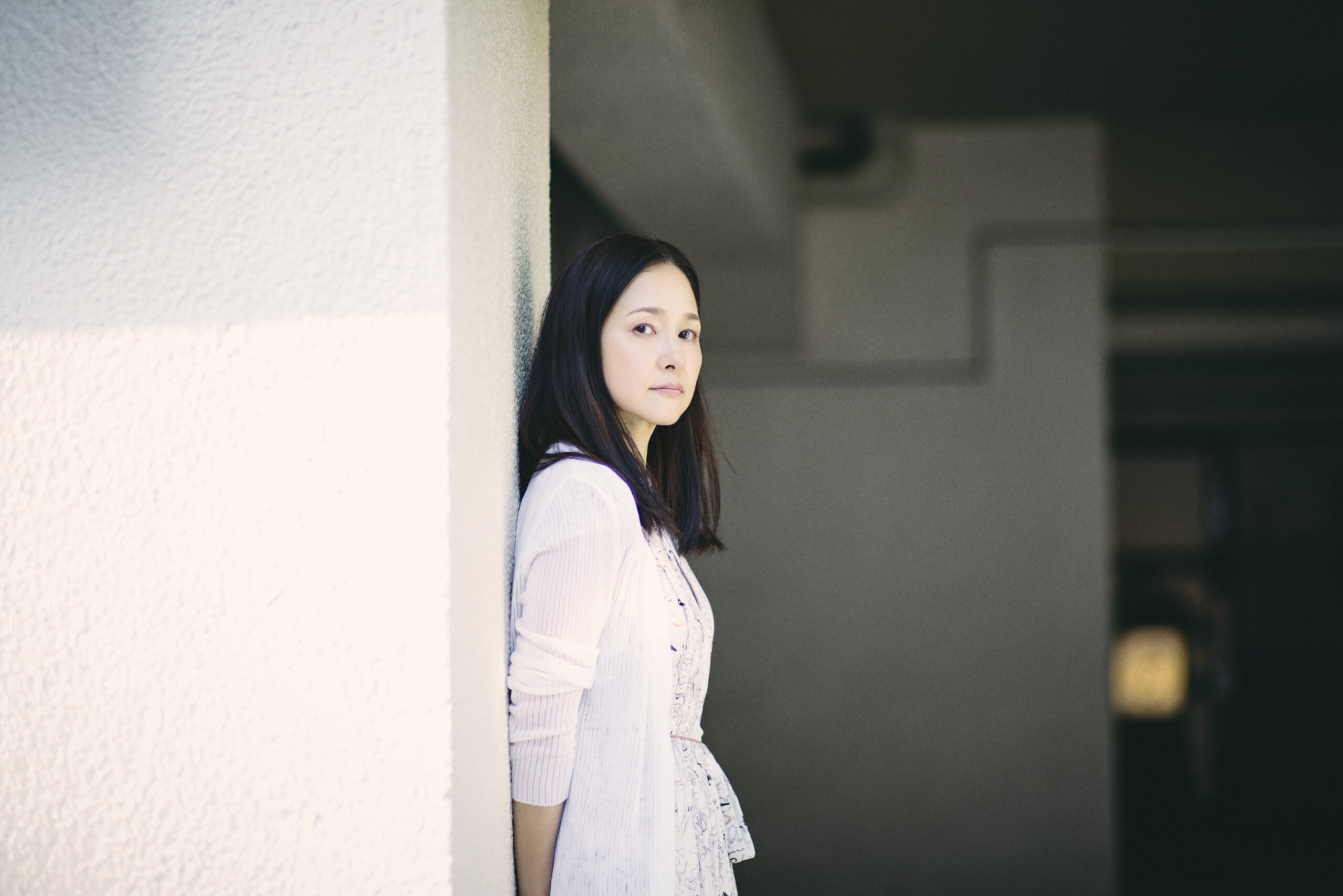
――I think the world of entertainment was a very different environment from the bank you worked for until then, but were you worried about continuing?
Oshidari Yes, it was certainly completely different. However, I always repeated the same routine at the bank, every day was a constant change at the filming location. For me, who gets bored easily, the world of acting was always a place where there were new encounters and excitement, and I felt a thrill.
――When you were in junior college, you said that you couldn’t find any dreams. After starring in the film “I Love You”, did you feel a sense of “finding your own way”?
Oshidari Yes, while I had the feeling that I had found my dream, I was still not prepared. Even if I passed the audition, I couldn’t get rid of the question, “Why was I chosen?” In the first place, I reflected on not being able to act well in “I Love You”, and I was very hesitant about whether I could continue as an actor. I auditioned enthusiastically, saying, “I want to show the real picture of Deaf people!”, but I didn’t think deeply about what happened after that.
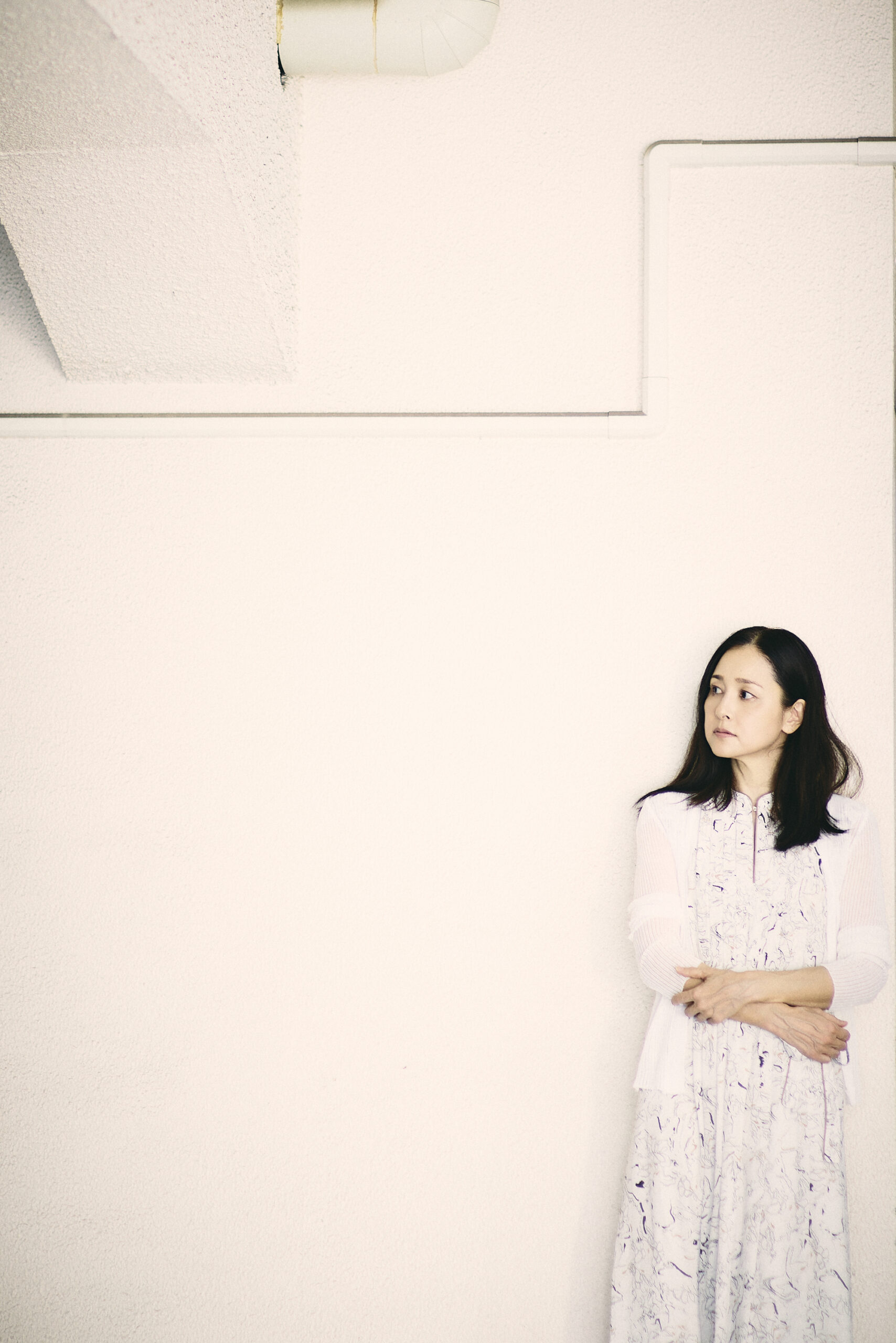
――Was there a reason why you made up your mind?
Oshidari After starring in the film, “I Love You”, I had the opportunity to travel to schools for the Deaf all over the country and give lectures. In the last question corner, one elementary school student asked me, “I want to be an actor when I grow up, can I become one?” At that time, I replied without hesitation, “Of course you can!” Because until then, the words from the adults made it impossible to have any dreams. That’s why I told the student that “you can”.
The child said with sparkling eyes, “Then I’ll do my best!” and when I saw that, I was really happy. I suddenly realized that if I continue to act, it may lead to the dreams and hopes of Deaf children. From there, I decided to “seriously pursue this path.” I get bored easily, but before I knew it, I had been acting for 26 years (laughs).
――Please tell us about the most memorable work in your 26 years.
Oshidari One is the film “I Love You”. This work was made with a focus on using Deaf actors from the planning stage, and the director herself said, “It became a work that could deliver the real appearance of Deaf people.” It was an opportunity for many people to become interested in sign language, and I was very moved to be able to be involved in such a significant social film.
Another thing that left an impression on me was the au commercial “Last Mail” produced in 2003. You can still see it on YouTube, and in a short amount of time, various feelings such as happiness, conflict, and frustration are carefully depicted. The other actor was Nao Omori, but this work is also very memorable in that it was the first commercial featuring a Deaf person.
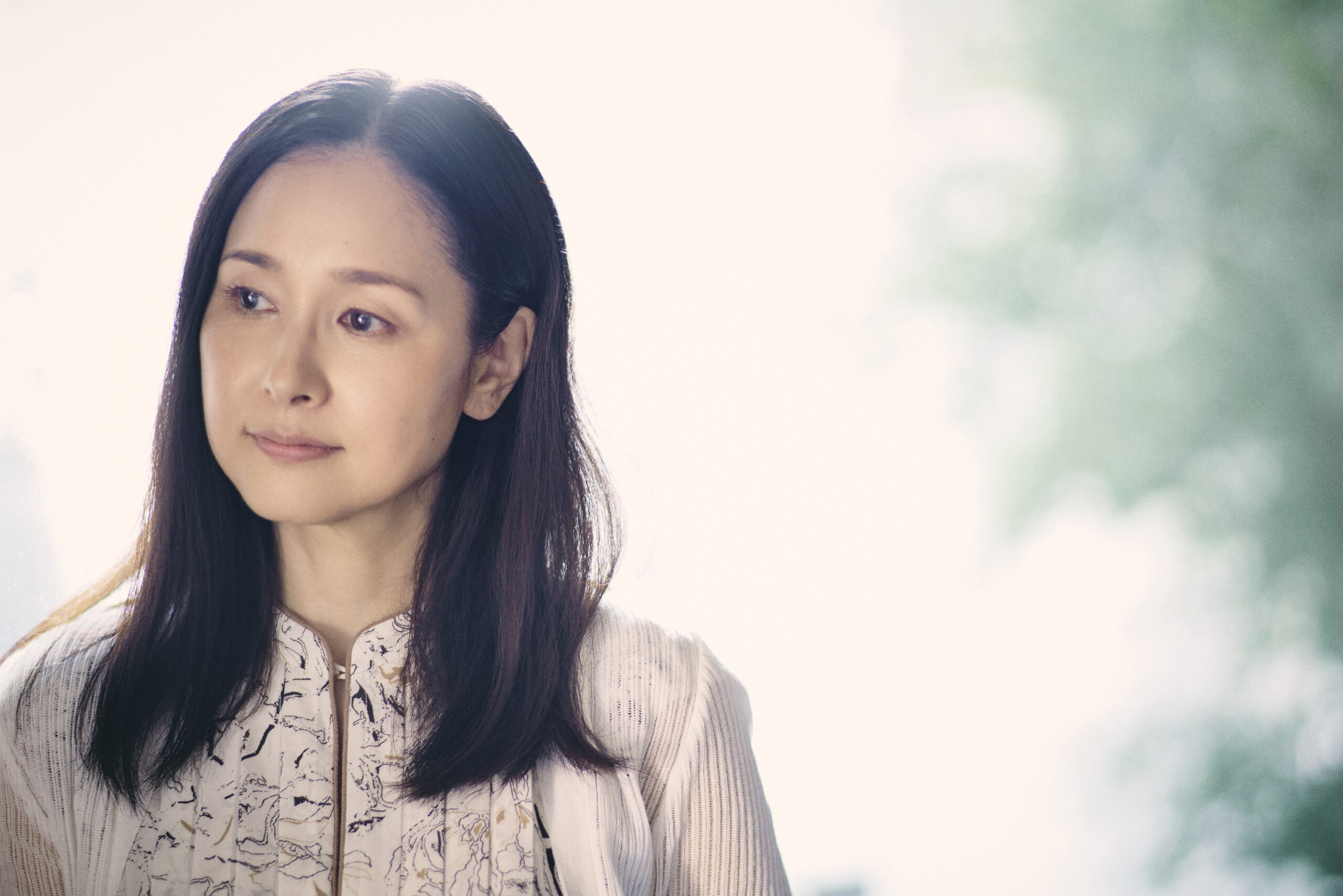
――I think there are still very few works that are depicted from the perspective of the Deaf, including dramas, movies, and stages. What do you think is necessary to depict the perspective of Deafness in more works in the future?
Oshidari I think it is necessary for Deaf people to actively work on it. And instead of creating it only by someone’s imagination, it is important for the hearing and the Deaf to have a dialogue and make up for each other’s shortcomings. If you try to depict a Deaf person only from the hearing person’s point of view, you will inevitably be biased towards the “Deaf image”. No matter how much you expand your imagination, I think there will still be a gap with reality.
――Where do you feel that gap?
Oshidari For example, when a hearing actor plays the role of a Deaf person, that person inevitably reacts to the slightest sound around and the eyes will wander in the direction of the sound. But Deaf people rarely have such eye movements. In fact, I once advised the hearing actors, “You may be able to hear it, but be patient with that.”
In addition, Deaf people can capture all kinds of information with their eyes, so they have a sensitive vision, and their field of vision is very wide. When something crosses or a person passes by at the edge of their field of vision, they react immediately and turn their eyes to it. Such eye movements are also unique to Deaf people.
Director Akihiro Yonaiyama of “I Love You” was consistently obsessed with the idea that “the role of a Deaf person shall be done by a Deaf person”. I agree with that idea.
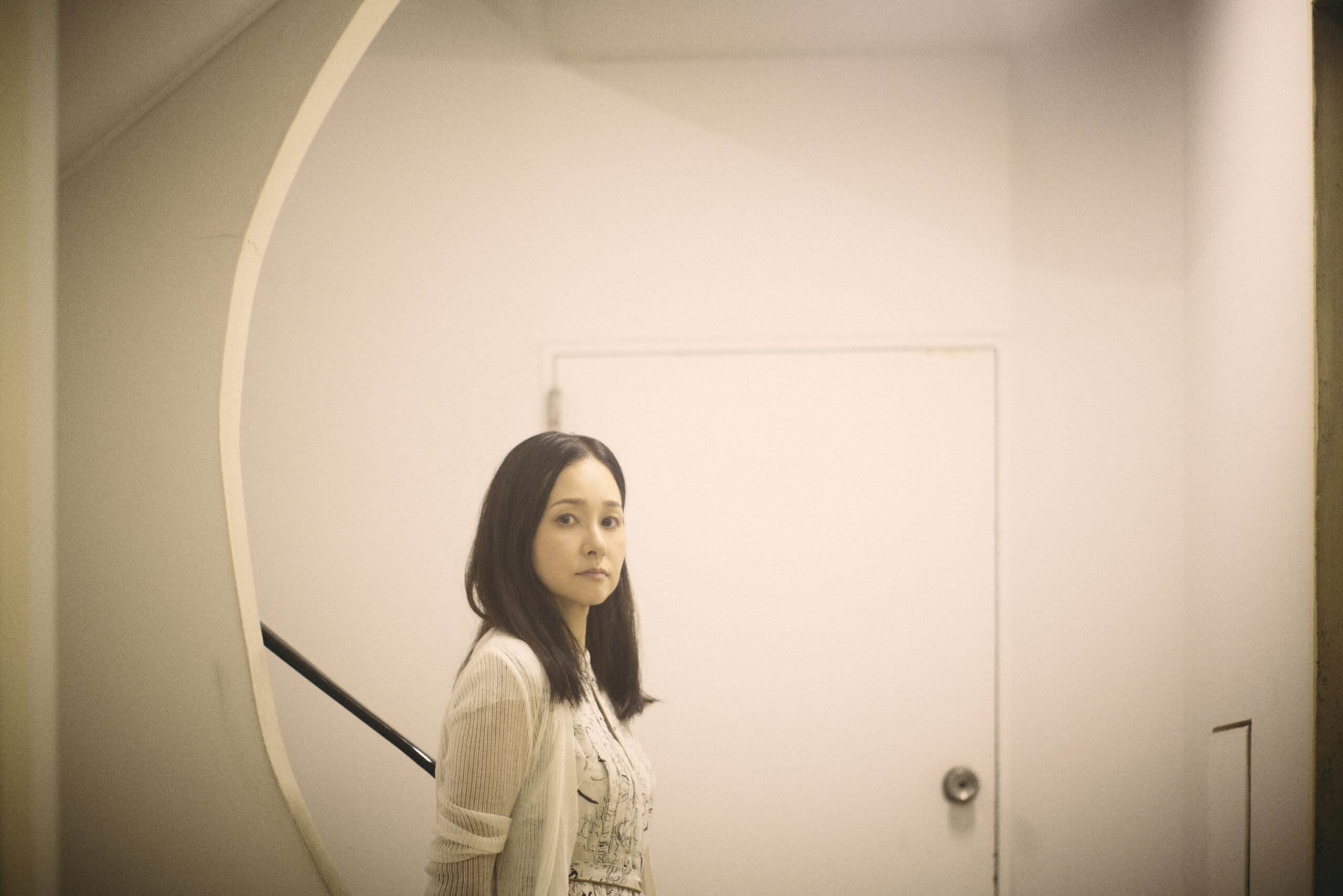
――If Deaf actors become more active in the future, it will lead to the dreams of Deaf children.
Oshidari I really think so. Currently, there are still few places where Deaf actors can act, but in recent years, there has been a movement of hope little by little. The 2021 American film “Coda” was a topical work depicted from the perspective of a Deaf person. After that, dramas depicting Deaf people were broadcasted in Japan from “Silent” in 2022 and “On a Starry Night” in 2023.
And last year, the movie “Living in Two Worlds” was released. In order not to stop this wave, we Deaf people must take initiatives. Whether it’s a movie, a drama, or performing on stage, it would be great if the hearing and the Deaf could work together to create an interesting work. To that end, we encourage them to do it. I would like to be more conscious of my activities so that I can create as many such meaningful opportunities as possible.
――Are there any roles you would like to play in the future?
Oshidari Playing a detective role in a suspense TV drama (laughs)! I don’t think there has ever been a setting for a Deaf person to be a detective. I read the movement of the mouth from a short distance and say, ” That person just said ‘drugs’! Let’s arrest that person (laughs). I would like to take advantage of the characteristics and special skills of Deaf people and challenge a work with an unprecedented setting that combines comedy and suspense. But regardless of genre, I want to try all kinds of roles.
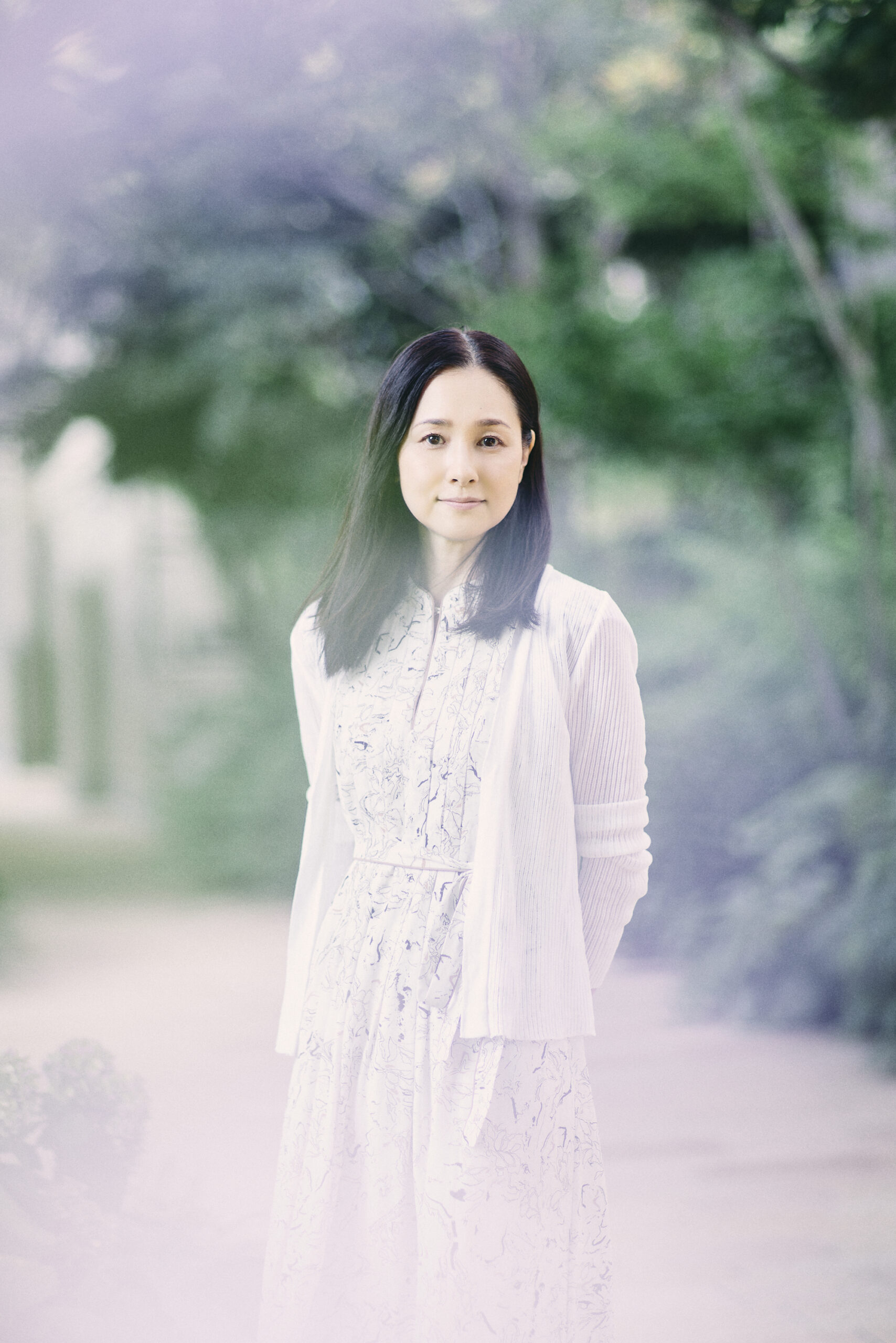
――Please tell us about your family. It seems that you have been married to actor Tsuyoshi Miura for 16 years, but what do you like about him? Sorry for the sudden direct question (laughs).
Oshidari Hmm, after being married for 16 years, the relationship becomes mature, so the feeling of “like” has calmly calmed down…(laughs) But my husband is a really kind-hearted person who always cares about me and says things like, “Do you want anything?”, “What do you want to eat?” or “Is there anything you want to do?” I feel that that is what is cool about him.
In the first place, I thought that Deaf people would marry Deaf people, so marrying my husband, who is a hearing person, was an unexpected event. I had a stereotype in me that hearing and Deaf people could not communicate with each other in their lives together. In particular, it often works well if the hearing person is a female and the Deaf person is male, but in the opposite case, there are strangely many couples leaving each other. That’s why I myself unconsciously thought that I will marry a Deaf person if I ever got married.
――The fact that you got married from there means that Tsuyoshi Miura is the one who changed your values.
Oshidari That can be said… I met my husband through a mutual actor and then co-starred on stage. One day, he invited me to a movie, which led us to start dating, but I still had a strong idea that we had to be Deaf, so I broke up with him after about six months.
However, six years later, we met again by chance… We were a little awkward with each other (laughs), but he asked me to exchange emails, and we started contacting each other and dating again. And we got married in 2009.
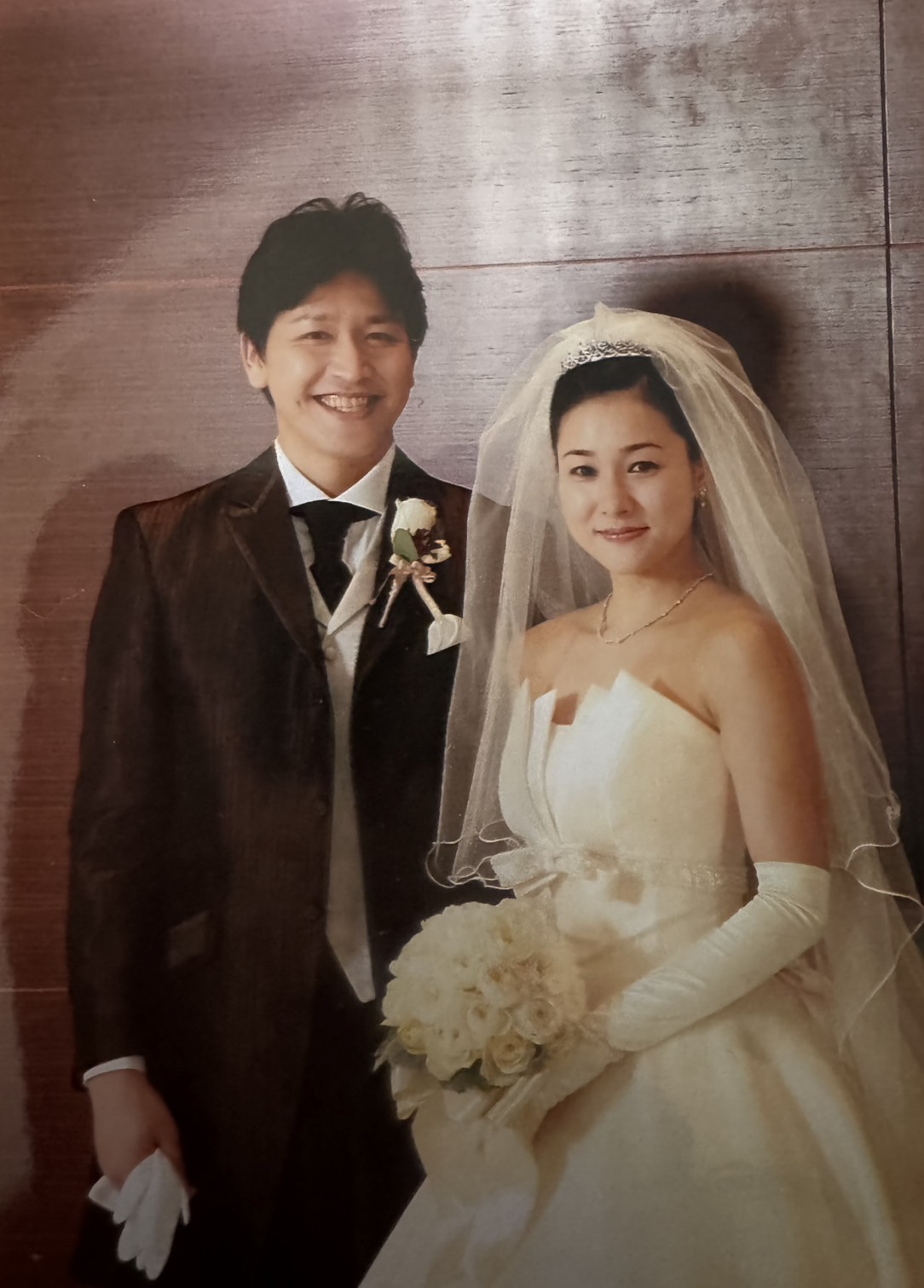
――What was the deciding factor in your second relationship?
Oshidari He was very enthusiastic about learning and using sign language from the beginning we met. It had been six years, so I thought, “I’m sure he must have already forgotten,” but he didn’t forget it at all, but actually improved (laughs). It seems that he has been thinking about me all the time… In the end, I guess I was “beaten down” (laughs). But I was really happy.
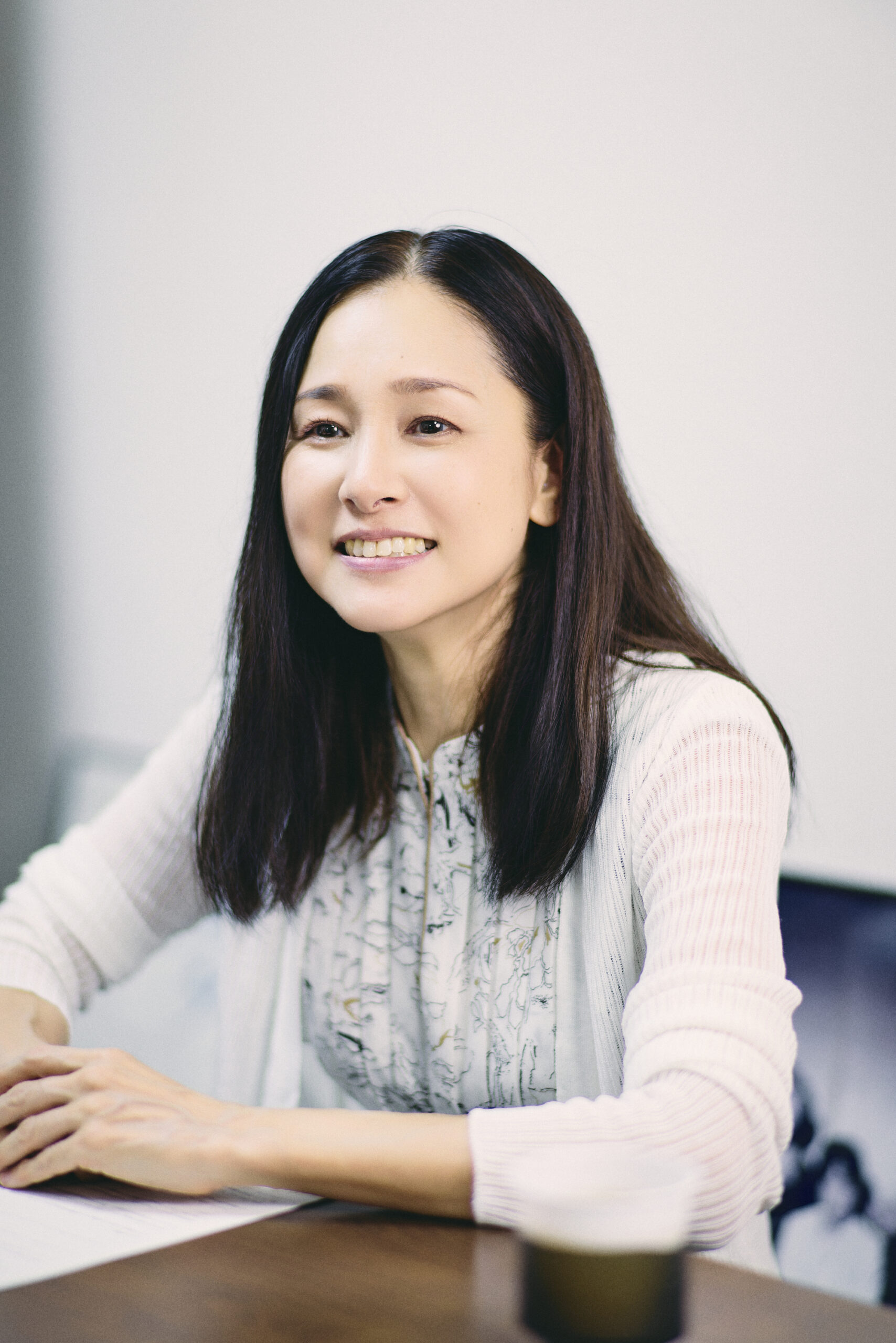
――Even though you were “beaten down” , it’s a heartwarming episode (laughs). You mentioned in the beginning, but you have a daughter who will be in the second year of junior high school.
Oshidari Yes, my daughter is a hearing person just like my husband and can also use sign language. When there are no subtitles on TV, she is a kind child who interprets for me. At the time, I thought it might be difficult to give birth, but I was able to have a daughter at the age of 41. My mother was a strict person in terms of studying and lifestyle habits, but after becoming a mother myself, I finally came to understand that feeling.
People often ask, “Was it difficult to raise a child when you cannot hear?”, but I think that the difficulty of childcare is the same regardless of whether you are a hearing or Deaf person. My husband also helped me make milk and change diapers, and I have been raising my child with the help of useful devices such as lamps that light up in response to crying.
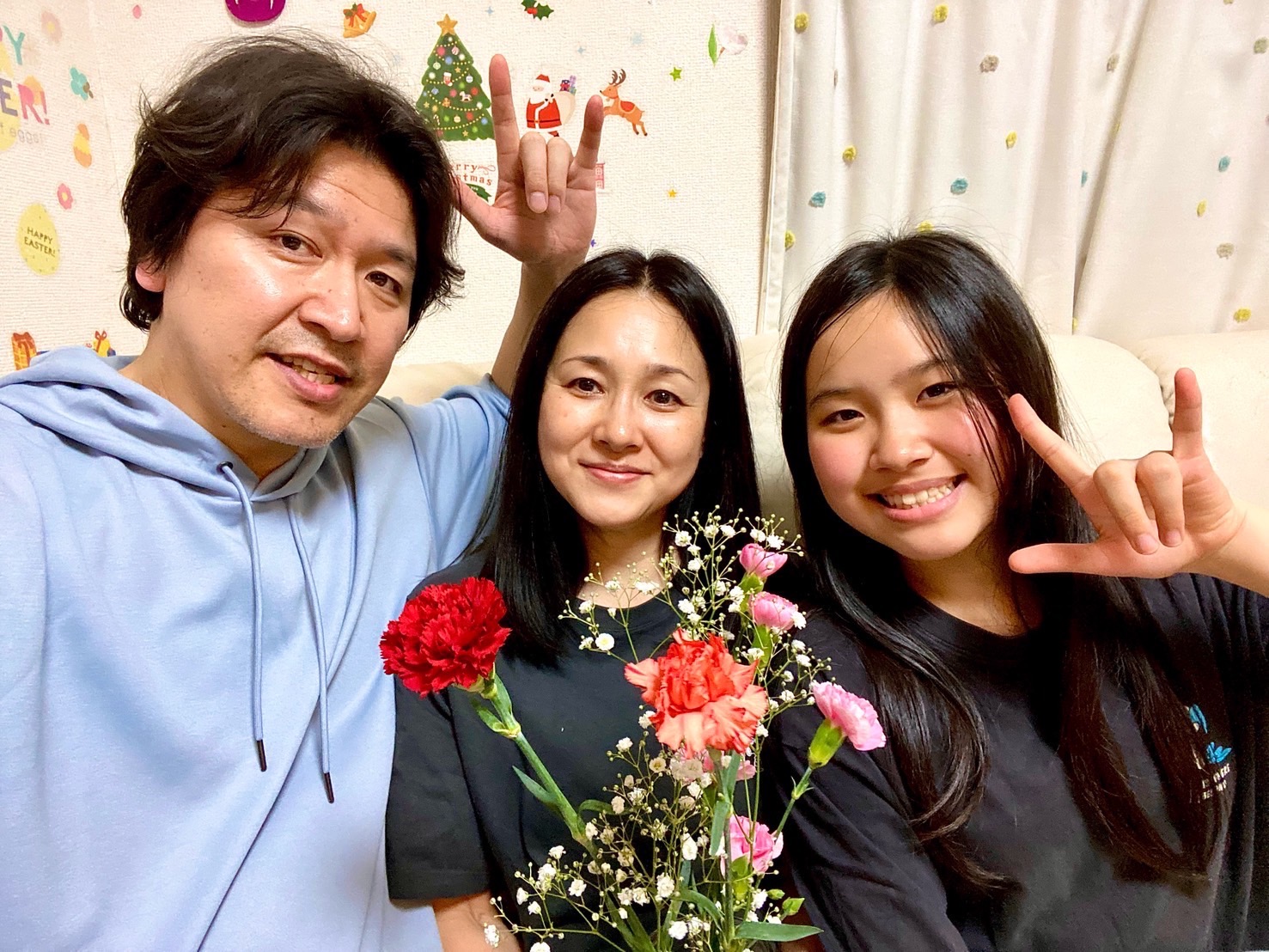
――Does your daughter have a rebellious period?
Oshidari She is 13 years old now, but she hasn’t had it yet. She just lightly answers back, “Mom, what are you talking about?” “You need to think more!” Maybe I’m just not aware of it, and she is already in a rebellious period (laughs).
But it seems like Ryo Yoshizawa, who co-starred in the film did not have a rebellious period. When I asked him, “Did you have a rebellious period?”, he gave an immediate answer “No.” I was wondering if there were people like that, and that he must have been a good boy, but maybe my daughter will be going through a rebellious period soon (laughs).
――I would like to ask you about the Deaflympics, but when did you first learn about the Deaflympics?
Oshidari I had never actually been there because it was held overseas, but I had known about the Deaflympics for many years. So, when it was decided that it would be held in Japan, I was very happy. However, the recognition of the Deaflympics is still low, so I hope that many people will take this opportunity to learn about the Deaflympics and Deaf Sports. For that reason, I hope that the Deaflympics posters will be displayed in places where many people can see them, such as cafes and movie theaters, as well as train stations. I hope the city will be overflowing with the Deaflympics.
――Are there any sports you are looking forward to or athletes you are supporting?
Oshidari I guess it will be differential table tennis. When I participated in the “Subtitles for the World” exhibition held in May, I became very close with Riho Kamezawa. She is always smiling and cheerful, and when we are together, it makes me smile. I want everyone in Japan and the world to know about her, and I sincerely support her to win the gold medal.
But after all, I want to support athletes who are working on various sports with all my might as one of the Deaf people. Because it is a big stage, I want everyone to play an active role to the fullest. And I would like the hearing people to see them at the venue!
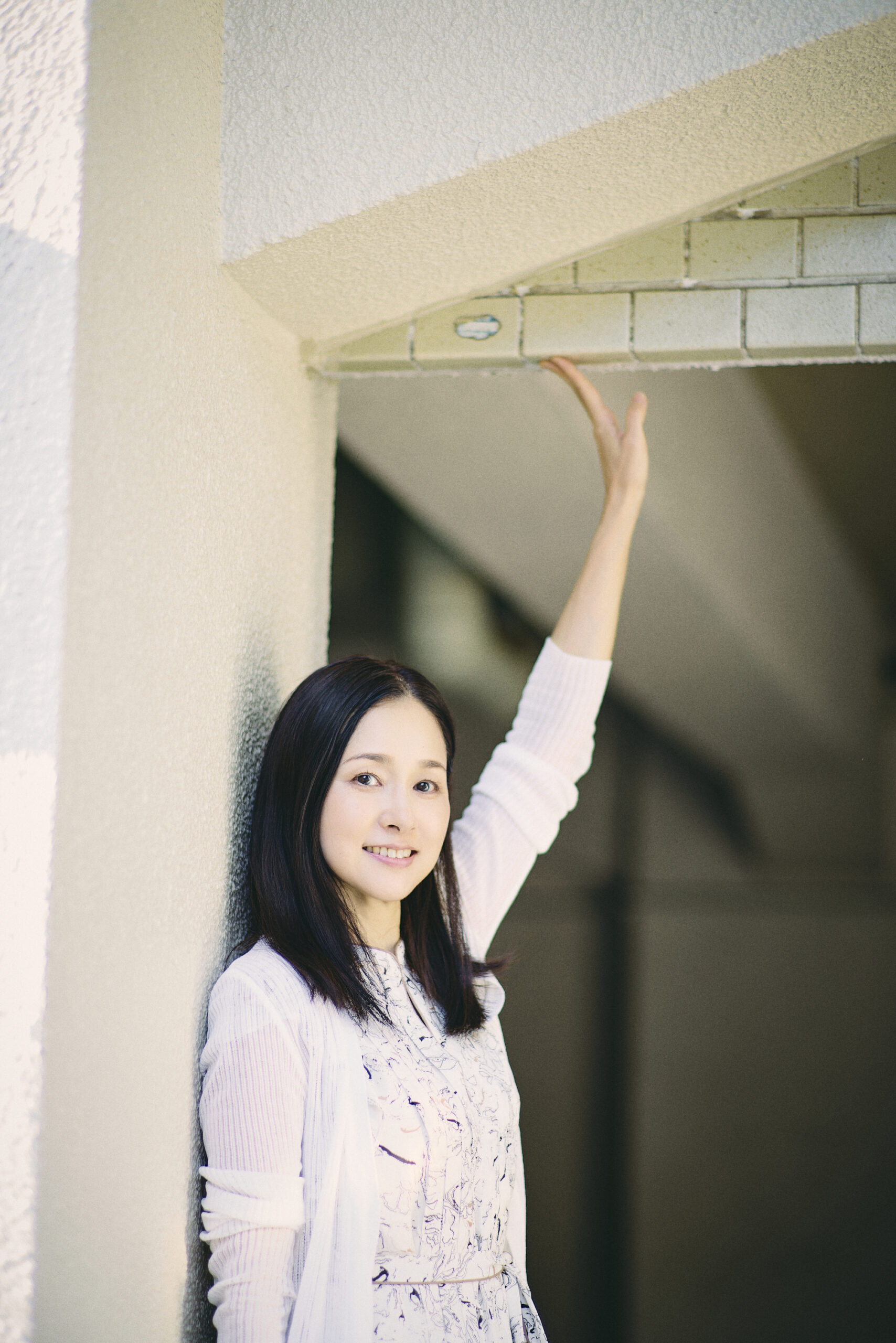
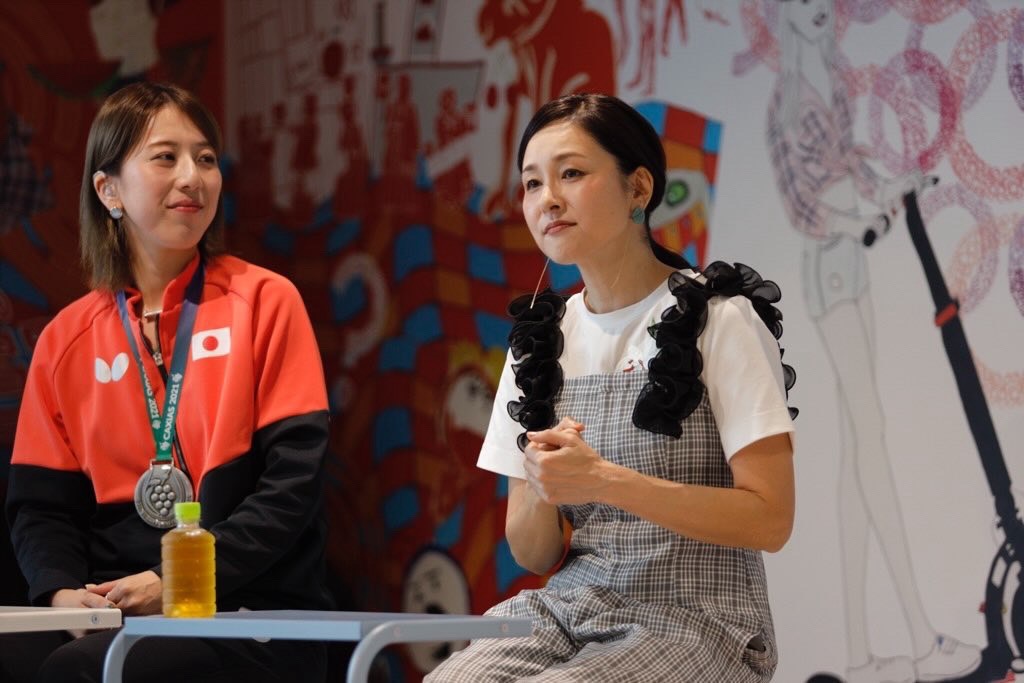
――Is there anything you want to convey through the Deaflympics or what are your expectations for the Games?
Oshidari The Deaflympics are held once every four years. This time it will be held locally, so I think the whole of Japan will be excited, but there are four years until the next tournament. I hope you will not forget the feeling of continuing to support the athletes even after the tournament is over.
Of course, I will also continue to support. And it would be wonderful if everyone could welcome the Deaflympics with excitement in the upcoming tournament and future tournaments.
――I think that holding the Deaflympics will increase opportunities for hearing and Deaf people to communicate. From your own experience, what do you think it takes for both sides to understand each other? Do you have any advice or tips for hearing people?
Oshidari Even if the hearing people can’t see the other person, they can know whether they are happy or angry and how they feel from their way of talking and tone of voice, right? On the other hand, Deaf people can sense the other person’s feelings from their facial expressions. That’s why it’s most important to talk face to face, look into each other’s eyes and talk. Don’t worry if you can’t use sign language. In addition to written communication, there are now many convenient means of communication such as smartphones and apps compared to the past.
Also, if you really want to convey your feelings, you can communicate properly with your gestures. The important thing is not to think too hard, but to communicate naturally and have fun. I would be happy if we could get to know the difference between each other and shorten the distance.
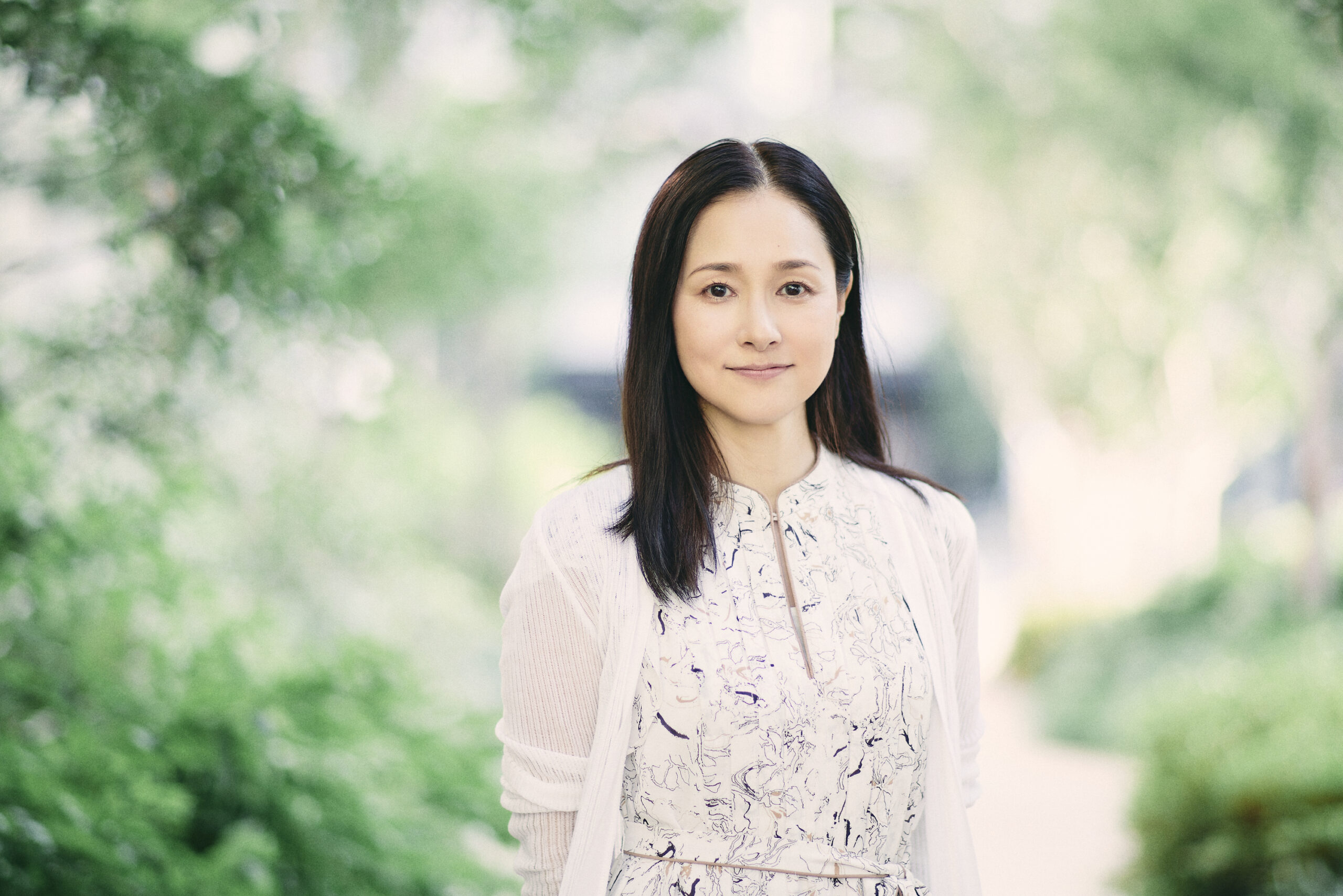
Akiko Oshidari / Born in Hokkaido in 1970
Deaf actor
After graduating from Yokohama City School for the Deaf (currently Yokohama City Special Needs School for the Deaf), she went on to Aoba Gakuen Junior College. After working at a bank for five years, she entered the world of expression after appearing on NHK’s sign language program “Let’s Sing in Noppo’s Sign Language”.
She made her debut as an actress when she was selected for the lead role in the 1999 film “I Love You”. For the same film, she won the Mainichi Film Competition Sponichi Grand Prix Newcomer Award and attracted attention.
In 2002, she co-starred with actor Tsuyoshi Miura in the stage “Wait Until the Storm” and got married in 2009. She gave birth to a baby girl in 2012. In recent years, she has continued to be active as an actor, and in the film “Living in Two Worlds” released in 2024, she played the role of the mother of a young CODA boy, played by Ryo Yoshizawa. She won the Best Supporting Actress Award at the Kinema Junpo Best Ten Award and the Japan Film Critics’ Awards.
IG:akiko_oshidari
X:@a_oshidari6
text by Hiromi Hiraki
photographs by Uta Mukuo
2025.10.09
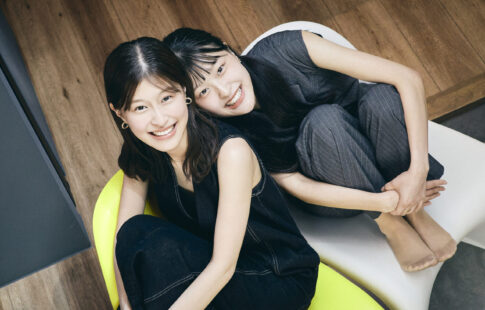
目次Until I accept my “Deaf self”A new scenery opened up by challengesBehind the 1 million You Tube […]
2025.10.09
目次Until I accept my “Deaf self”A new scenery opened up by challengesBehind the 1 million You Tube […]
2025.08.06
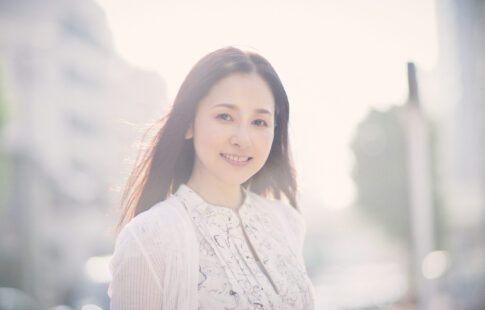
目次I was told that “I didn’t want to be born into a house like this”Hokkaido→ Yokohama→ Nagoya→ Yokohama […]
2025.08.06
目次I was told that “I didn’t want to be born into a house like this”Hokkaido→ Yokohama→ Nagoya→ Yokohama […]